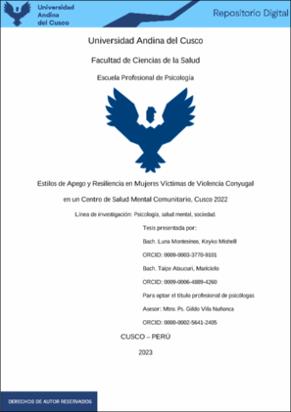| dc.contributor.advisor | Vila Nuñonca, Gildo | |
| dc.contributor.author | Luna Montesinos, Keyko Mishell | |
| dc.contributor.author | Taipe Ataucuri, Maricielo | |
| dc.date.accessioned | 2023-09-11T21:13:32Z | |
| dc.date.available | 2023-09-11T21:13:32Z | |
| dc.date.issued | 2023-07-03 | |
| dc.identifier.uri | https://hdl.handle.net/20.500.12557/5694 | |
| dc.description.abstract | El presente estudio se propuso como objetivo identificar si existe relación entre
los estilos de apego y resiliencia en mujeres víctimas de violencia conyugal de un Centro
de Salud Mental Comunitario en la ciudad del Cusco; por lo mismo, se utilizó un enfoque
cuantitativo, alcance descriptivo correlacional y diseño no experimental de corte
transeccional; siendo así que, se tuvo una muestra de 207 mujeres, a quienes se les aplicó
el Cuestionario de Apego CaMir-R y la Escala de Resiliencia. Obteniendo como
resultado que predomina el estilo de apego preocupado con 80,2 %, seguidamente del
estilo de apego evitativo con un 11,1% y el estilo de apego seguro con 8,7%; en cuanto
a los niveles de Resiliencia se halló que el 57,97% de las mujeres poseen un nivel
moderado, el 29.95% posee un nivel bajo y solo 12,08% un nivel alto; también, se
descubrió que no existe una correlación entre Resiliencia y cada una de las dimensiones
de los estilos de apego; por otro lado, no existe una relación altamente significativa entre
Resiliencia y las dimensiones, según grupo etario y grado de instrucción; finalmente, se
halló que sí existe una relación positiva y significativa entre los estilos de apego y
resiliencia en las mujeres víctimas de violencia conyugal de un Centro de Salud Mental
Comunitario en la ciudad del Cusco. | es_PE |
| dc.description.abstract | The objective of this study was to identify if there is a relationship between
attachment styles and resilience in women victims of spousal violence at a Community
Mental Health Center in the city of Cusco; For this reason, a quantitative approach,
correlational descriptive scope and non-experimental design of transectional cut were
used; being so, there was a sample of 207 women, to whom the CaMir-R Attachment
Questionnaire and the Resilience Scale were applied. Obtaining as a result that the
concerned attachment style predominates with 80.2%, followed by the avoidant
attachment style with 11.1% and the secure attachment style with 8.7%; Regarding the
levels of Resilience, it was found that 57.97% of women have a moderate level, 29.95%
have a low level and only 12.08% have a high level; also, it was discovered that there is
no correlation between Resilience and each of the dimensions of attachment styles; on
the other hand, there is no highly significant relationship between Resilience and the
dimensions, according to age group and level of education; Finally, it was found that
there is a positive and significant relationship between attachment styles and resilience
in women victims of spousal violence at a Community Mental Health Center in the city
of Cusco. | en_US |
| dc.format | application/pdf | es_PE |
| dc.language.iso | spa | es_PE |
| dc.publisher | Universidad Andina del Cusco | es_PE |
| dc.rights | info:eu-repo/semantics/openAccess | es_PE |
| dc.rights.uri | https://creativecommons.org/licenses/by-nc-nd/4.0/ | es_PE |
| dc.subject | Apego | es_PE |
| dc.subject | Estilos de apego | es_PE |
| dc.subject | Resiliencia | es_PE |
| dc.subject | Violencia conyugal | es_PE |
| dc.title | Estilos de apego y resiliencia en mujeres víctimas de violencia conyugal en un Centro de Salud Mental Comunitario, Cusco 2022 | es_PE |
| dc.type | info:eu-repo/semantics/bachelorThesis | es_PE |
| thesis.degree.name | Psicóloga | es_PE |
| thesis.degree.grantor | Universidad Andina del Cusco. Facultad de Ciencias de la Salud | es_PE |
| thesis.degree.discipline | Psicología | es_PE |
| dc.publisher.country | PE | es_PE |
| dc.subject.ocde | https://purl.org/pe-repo/ocde/ford#5.01.00 | es_PE |
| renati.advisor.dni | 24710910 | |
| renati.advisor.orcid | https://orcid.org/ 0000-0002-5641-2405 | es_PE |
| renati.author.dni | 71710676 | |
| renati.author.dni | 75252223 | |
| renati.discipline | 313016 | es_PE |
| renati.juror | Masias Ynocencio, Ysabel | |
| renati.juror | Del Castillo Estrada, Gareth | |
| renati.juror | Boisseranc Bonett, María Del Carmen Virginie | |
| renati.juror | Gamio Gonzales, Luis Fernando | |
| renati.level | https://purl.org/pe-repo/renati/level#tituloProfesional | es_PE |
| renati.type | https://purl.org/pe-repo/renati/type#tesis | es_PE |
| dc.description.lineadeinvestigacion | Psicología, salud mental, sociedad. | es_PE |




